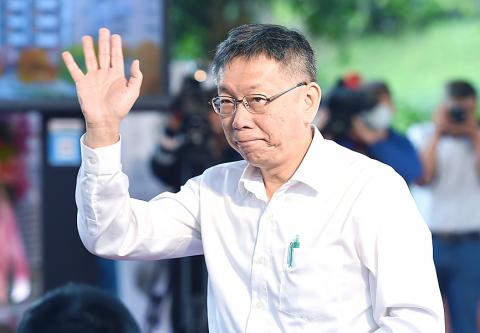Taipei Mayor Ko Wen-je (柯文哲) yesterday said that if people do not want to vote in the elections, they should just not vote, rather than casting invalid votes.
His supporters are reportedly urging others to cast an invalid vote in the Jan. 11 presidential election.
Ko, who is also chairman of the Taiwan People’s Party (TPP), was responding to a comment made by his close aide, former Taipei City Government adviser Tsai Pi-ju (蔡壁如), in a radio interview on Sunday.

Photo: Liao Chen-huei, Taipei Times
She is listed fifth on the TPP’s legislator-at-large nominees list.
Tsai said that if Ko ran for president, it is estimated that he would have a support rate of about 20 to 25 percent, but so far opinion polls showed that the TPP only has a support rate of about 8 to 10 percent, meaning there is room for improvement.
She said that many people still are not aware that Ko founded the party, so the party would continue to reinforce the image that “Ko equals the TPP” in weeks before the Jan. 11 legislative elections.
Many of Ko’s supporters have told her that they do not know who to vote for in the presidential election, so some people are initiating a “spoilt votes movement,” urging others to write “Ko Wen-je” on the ballot and cast invalid votes.
When asked by the radio host if she supports the movement, Tsai said she should not encourage people to cast invalid votes, but the number of invalid votes could represent how many people are dissatisfied with their options or reveal the number of hidden Ko supporters, which could be a reference for predicting the outcome of the 2024 election.
Asked for a comment yesterday, Ko said: “I do not think it is necessary, just keep a calm attitude and keep the election clean.”
“Do not go and vote if you do not want to vote, but do not destroy the ballot, and just keep the election clean,” he said, adding that the 2024 election in not yet a concern.
Public opinion in Taiwan often swings from one side to the other, Ko said, adding that the Democratic Progressive Party (DPP) suffered a major defeat in the nine-in-one elections last year, but has reversed the situation now.
He thinks keeping his base voters is good enough, Ko said.
Asked whether the situation in Hong Kong might affect young voters’ willingness to vote in the elections, Ko said he thinks it would, and that the problems in Hong Kong have become a chronic disease that the Beijing government should think practically about.
He was also asked to comment on a remark by Kaohsiung Mayor Han Kuo-yu (韓國瑜), the Chinese Nationalist Party’s (KMT) presidential candidate, that the Chinese Communist Party (CCP) could not manipulate the Hong Kong district council elections, so it is unlikely to meddle in Taiwan’s elections.
Ko said that the CPP failed in controlling the Hong Kong elections this time, but that does not mean it is incapable of doing so.

The brilliant blue waters, thick foliage and bucolic atmosphere on this seemingly idyllic archipelago deep in the Pacific Ocean belie the key role it now plays in a titanic geopolitical struggle. Palau is again on the front line as China, and the US and its allies prepare their forces in an intensifying contest for control over the Asia-Pacific region. The democratic nation of just 17,000 people hosts US-controlled airstrips and soon-to-be-completed radar installations that the US military describes as “critical” to monitoring vast swathes of water and airspace. It is also a key piece of the second island chain, a string of

A magnitude 5.9 earthquake that struck about 33km off the coast of Hualien City was the "main shock" in a series of quakes in the area, with aftershocks expected over the next three days, the Central Weather Administration (CWA) said yesterday. Prior to the magnitude 5.9 quake shaking most of Taiwan at 6:53pm yesterday, six other earthquakes stronger than a magnitude of 4, starting with a magnitude 5.5 quake at 6:09pm, occurred in the area. CWA Seismological Center Director Wu Chien-fu (吳健富) confirmed that the quakes were all part of the same series and that the magnitude 5.5 temblor was

The Central Weather Administration has issued a heat alert for southeastern Taiwan, warning of temperatures as high as 36°C today, while alerting some coastal areas of strong winds later in the day. Kaohsiung’s Neimen District (內門) and Pingtung County’s Neipu Township (內埔) are under an orange heat alert, which warns of temperatures as high as 36°C for three consecutive days, the CWA said, citing southwest winds. The heat would also extend to Tainan’s Nansi (楠西) and Yujing (玉井) districts, as well as Pingtung’s Gaoshu (高樹), Yanpu (鹽埔) and Majia (瑪家) townships, it said, forecasting highs of up to 36°C in those areas

IN FULL SWING: Recall drives against lawmakers in Hualien, Taoyuan and Hsinchu have reached the second-stage threshold, the campaigners said Campaigners in a recall petition against Chinese Nationalist Party (KMT) Legislator Yen Kuan-heng (顏寬恒) in Taichung yesterday said their signature target is within sight, and that they need a big push to collect about 500 more signatures from locals to reach the second-stage threshold. Recall campaigns against KMT lawmakers Johnny Chiang (江啟臣), Yang Chiung-ying (楊瓊瓔) and Lo Ting-wei (羅廷瑋) are also close to the 10 percent threshold, and campaigners are mounting a final push this week. They need about 800 signatures against Chiang and about 2,000 against Yang. Campaigners seeking to recall Lo said they had reached the threshold figure over the